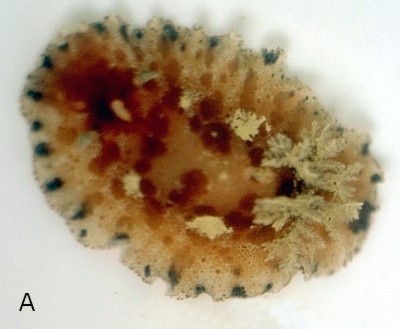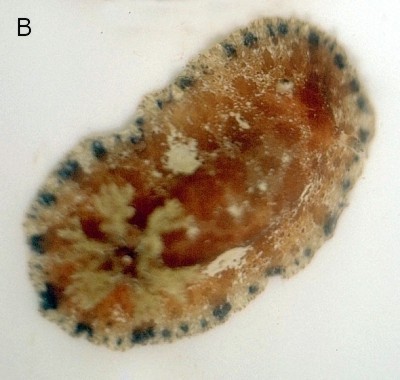

Platydoris pulchra
Eliot, 1904
Order: NUDIBRANCHIA
Suborder: DORIDINA
Superfamily: EUDORIDOIDEA
Family: Dorididae
DISTRIBUTION
Indian Ocean - Tanzania, Kenya, Madagascar, Sri Lanka
PHOTO
Locality: Fumba, Zanzibar, Tanzania. under rocks on reef flat. 2 specimens 50 mm and 45 mm long alive. 6 August 1971. Photo: Bill Rudman.
The body shape is typical for the genus with a wide mantle skirt and relatively narrow body, The mantle skirt is firm and leathery to touch. The edge of the gill pocket is raised and lobed, and the rhinophore pockets are slightly raised. The mantle has a translucent white background colour but it is mainly obscured by light orange and patches of darker orange. Around the mantle edge there are purplish blue patches. The underside of the mantle is translucent white with small bluish patches.
-
Dorgan, K.M., Valdes, A. & Gosliner, T.M. (2002) Phylogenetic systematics of the genus Platydoris (Mollusca, Nudibranchia, Dorididea) with descriptions of six new species. Zoologica Scripta, 31(3): 271-319.
-
Eliot, C.N.E. (1904) On some nudibranchs from East Africa and Zanzibar. Part III. Dorididae Cryptobranchiatae, I. Proceedings of the Zoological Society of London, 1903(2): 354-385, Pls. 32-34.
Rudman, W.B., 2003 (October 16) Platydoris pulchra Eliot, 1904. [In] Sea Slug Forum. Australian Museum, Sydney. Available from http://www.seaslugforum.net/find/platpulc
Related messages
Platydoris pulchra? from the Red Sea
May 27, 2009
From: Erwin Koehler


Concerning message #22283:
Dear Bill,
Is this one also Platydoris pulchra ?
It is from Hurghada, Egypt, Red Sea. Photographer: Sven Kahlbrock
No other data recorded
Erwin.
Erwin@Philippine-Sea-Slugs.com
Koehler, E., 2009 (May 27) Platydoris pulchra? from the Red Sea. [Message in] Sea Slug Forum. Australian Museum, Sydney. Available from http://www.seaslugforum.net/find/22493
Dear Erwin,
I guess you realised there were two animals in the photo - a large one half hidden under the coral colony and a small one nestled up to its larger 'friend'. One of the reasons these 'large flat dorids' are still difficult to identify is that they are often difficult to photograph, and their undersides - which often provide the best colour clues to their identification - are never photographed. Their habit of nestling and squeezing into impossible cracks and crevices also means they are often not collected.
I suspect this animal is Platydoris pulchra, but we don't know enough about variation in this group of dorids to be sure.
Best wishes,
Bill Rudman
Platydoris pulchra from Zanzibar
May 21, 2009
From: Bill Rudman


Vie Panyarachun's message [#22283] made me realise that all the photos at present on the Forum of Platydoris pulchraare rather different in colour from Eliot's original descripton from East Africa. In fact one animal [message #18679] may be Platydoris ellioti rather than P. pulchra. I am also posting a photo of P. ellioti from Tanzania [message #22490]
Locality: Fumba, Zanzibar, Tanzania. under rocks on reef flat. 2 specimens 50 mm and 45 mm long alive. 6 August 1971. Photo: Bill Rudman.
They were photographed in rather primitive conditions - which is my excuse for the out of focus bits - but they show the basic elements of the colour pattern as described by Eliot - reddish brown background colour with darker blotches, and bluish blotches around the mantle edge. In my field notes I record that the underside of the mantle is a bright yellow orange with red brown blotches around the edge and finer stippling over the rest of the mantle skirt.
Best wishes,
Bill Rudman.
Platydoris pulchra from Thailand
May 21, 2009
From: Vie Panyarachun


Dear Dr. Rudman,
I hope you can help me with IDing this one. The colours reminds me of some photos I have seen of Chromodoris alternata but this particular animal was found in Thailand during a night dive.
Locality: Ko Tachai, Similan Islands National Park, 4 msw, Thailand, Andaman Sea, 21 February 2009, Shallow reef. Length: Not sure.... Photographer: Vie Panyarachun.
Thank you so much.
Vie Panyarachun
vpanyarachun@hotmail.com
Panyarachun, Vie, 2009 (May 21) Platydoris pulchra from Thailand. [Message in] Sea Slug Forum. Australian Museum, Sydney. Available from http://www.seaslugforum.net/find/22283
Dear Vie,
It does have a general resemblance to C. alternata but if you look at the close-up, you will see in the light brown foreground that the mantle is covered in small tubercles. I am pretty sure this is Platydoris pulchra. None of the photos on the Forum at present show very 'typical' specimens of this species so in a separate message [ #22489] I have included some specimens I photographed in Zanzibar, Tanzania in the 1970s. This species was originally described from east Africa and this is the first record of it so far east in the Indian Ocean.
As you will see from my photos, your animal has a much redder pigmentation than animals I am familiar with, but the arrangement of the various colours and the dull purplish blotches a round the edge are very similar.
Best wishes,
Bill Rudman
Platydoris pulchra from Oman
December 21, 2006
From: Jasper Lansink

Hello Bill,
Here is another photo. The orange nudibranch looks like a chromodorid but I could not determine which one. Possibly a color variation. It was laying eggs as you can see on the picture (Doris style?).
Locality: Muscat - Bandar Khairan, 11 meters, Oman, Gulf of Oman, 18 and 21 september 2006, Coral, Sea, No currents. Length: 5 and 3 cm. Photographer: Jasper Lansink.
Can you help me in determining the species?
Thanks very much!!!
Jasper
jasper@aquadonna.nl
Lansink. J., 2006 (Dec 21) Platydoris pulchra from Oman. [Message in] Sea Slug Forum. Australian Museum, Sydney. Available from http://www.seaslugforum.net/find/18679
Dear Jasper,
This is an interesting find. It is Platydoris pulchra which is only known from a few records, mainly from the eastern Indian Ocean. It's nice to get a good photo of it so I have one for the Fact Sheet. I found it a few times when I lived in Tanzania but my photos of it were terrible. Although the animal is in comtact with the egg ribbon, it is relatively small for the size of the animal. From the position, I don't think it is in the process of laying the eggs so unless you actually saw it laying the eggs I think we will have to say the eggs 'may be' those of this animal rather than just that they 'are'.
Best wishes,
Bill Rudman
Platydoris pulchra? - yellow eggs
October 17, 2003
From: Charles Rowe


Hi Bill,
We managed to get a dive in on Saturday but the vis was miserable only 2-3 metres so my nose was stuck to the reef. Fortunately I managed to get some really good photos including the ones below. All were taken on 11 October 2003 at Whitesands Port Elizabeth at 14 metres.
When I took this one I could only see the beautiful eggs and so took 3 shots. On downloading them onto my PC and examining the shot more closely I am convinced this is of another nudi, which I haven't seen before, laying those yellow eggs! Can you believe my joy at getting these photos. As you can tell I was concentating on the eggs and so the nudi is not as clear as I would have liked.
See ya.
Charles ...
bumff@mweb.co.za
Rowe, C., 2003 (Oct 17) Platydoris pulchra? - yellow eggs. [Message in] Sea Slug Forum. Australian Museum, Sydney. Available from http://www.seaslugforum.net/find/11247
Dear Charles,
Thanks for this shot. It's most likely the egg ribbon belongs to the slug but we need 'smoking gun' evidence to be sure. The nudibranch is quite an interesting find as well. I think it is probably Platydoris pulchra, which at present is known further north from Tanzania, Kenya, Madagascar and Sri Lanka. The other possibility is Dendrodoris caesia which is endemic to South Africa. The blue spots around the edge are similar to those describes sometimes for that species. One clear difference between the two is that species of Platydoris have a tough leathery feel, and the mantle skirt is fairly rigid, while in species of Dendrodoris the body feels smooth and mantle and body are soft and fleshy. Perhaps Terry Gosliner can give us his opinion on this animal
Best wishes
Bill Rudman
